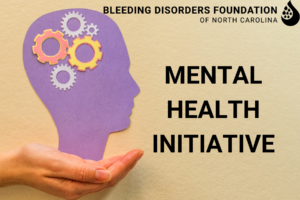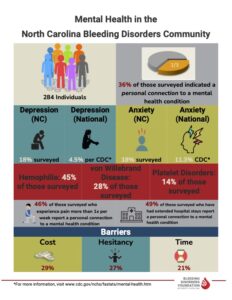 The Bleeding Disorders Foundation of North Carolina (BDFNC) knows that physical health and mental health go hand-in-hand. BDFNC has ongoing initiatives dedicated to improving the mental health of people with bleeding disorders and their loved ones. Here is a list of resources to help you manage your emotional wellness and mental health. If there is anything else you need related to mental health, please do not hesitate to reach out. We are here for you.
The Bleeding Disorders Foundation of North Carolina (BDFNC) knows that physical health and mental health go hand-in-hand. BDFNC has ongoing initiatives dedicated to improving the mental health of people with bleeding disorders and their loved ones. Here is a list of resources to help you manage your emotional wellness and mental health. If there is anything else you need related to mental health, please do not hesitate to reach out. We are here for you.
If you are at imminent risk of suicide, harm to others, or currently experiencing a mental health emergency crisis situation, please dial 911 or go to your nearest emergency room.
As of July 2022, the Suicide and Crisis Lifeline can be easily reached by dialing or texting 988. When contacting 988, you will be connected to a trained counselor who can provide support and connect you with valuable resources.
Mental Health in the North Carolina Bleeding Disorders Community
Survey Results

In late 2021 into early 2022, BDFNC administered a Mental Health Survey in partnership with the UNC Wilmington Department of Social Impact to assess the connection between bleeding disorders and mental health conditions. More than 30% of patients with a bleeding disorder reported a connection to a mental health condition, with the majority of respondents reporting depression and/or anxiety. Learn more about the results by reading the Mental Health Survey Results article here.
Help BDFNC to normalize the conversations about mental health conditions and #endthestigma. Please fill out a short, anonymous SURVEY.
Resources
To search for mental health crisis walk-in centers by county, please visit the NCDHHS site here.
If no walk-in crisis center is available in your county, please go to the nearest Emergency Department. If the person in crisis cannot be safely transported to a walk-in crisis center or Emergency Department, please call 911.
Crisis Text Line: Text HOME to 741741 to be connected with a crisis counselor 24/7.
Suicide and Crisis Lifeline, 988lifeline.org: Call or text 988 or call 1-800-273-TALK(8255)
Hope4NC Helpline: to connect North Carolinians to mental health resources: 1-855-587-3463
National Parent Helpline: providing emotional support and advocacy: 1-855-427-2736
National Alliance on Mental Illness (NAMI) North Carolina is the state affiliate of NAMI that raises awareness and provides education, advocacy, and support for people affected by mental illness. There are additional affiliate chapters across North Carolina.
Mental Health America (MHA) is the leading community-based nonprofit dedicated to addressing the needs of those living with mental illness and to promoting overall mental health to all. MHA has several affiliate chapters across North Carolina.
Crisis Solutions North Carolina is an initiative of the North Carolina Department of Health and Human Services (NCDHHS) – Division of Mental Health and Development Disabilities and Substance Abuse Services.
Psychology Today is a website designed to help you find therapists, psychiatrists, and other mental health providers.
North Carolina Families United is a family support and advocacy organization for children and youth who have a mental health and/or intellectual diagnosis.
The BDFNC Mental Health Resource Guide is a booklet with helpful resources for managing your mental health. To request a copy, please contact info@bleedingdisordersnc.org.

Bleeding Disorders Substance Use & Mental Health Access Coalition – BD SUMHAC
BD SUMHAC is a national coalition made up of members from the National Hemophilia Foundation, the Hemophilia Federation of America, HTC providers, chapter staff, and community members from around with country with a mission to advocate for access to appropriate substance use and mental health treatment facilities for all individuals with bleeding disorders.
BD SUMHAC has developed a toolkit for your HTC or other medical providers that can be used if you are in need of inpatient or residential substance use or mental health treatment and is in the process of developing a toolkit for patients with bleeding disorders.
If you have been denied access to inpatient or residential substance use or mental health treatment facilities, please contact Gillian Schultz, BDFNC Director of Programs and BD SUMHAC coalition member, or Kate Bazinsky, BD SUMHAC chair.
National Alliance on Mental Health North Carolina (NAMI NC) blog post: A Chronic Condition Should Not be a Barrier to Behavioral Health Care
You can contact the social worker at your Hemophilia Treatment Center for general (non-urgent) mental health questions or contact your primary care provider to discuss mental health treatment and possibly obtain a referral to a mental health provider.
